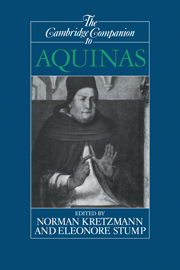Book contents
- Frontmatter
- Introduction
- 1 Aquinas's philosophy in its historical setting
- 2 Aristotle and Aquinas
- 3 Aquinas and Islamic and Jewish thinkers
- 4 Metaphysics
- 5 Philosophy of mind
- 6 Theory of knowledge
- 7 Ethics
- 8 Law and politics
- 9 Theology and philosophy
- 10 Biblical commentary and philosophy
- Bibliography
- References to Aquinas's Works
- Index
5 - Philosophy of mind
Published online by Cambridge University Press: 28 May 2006
- Frontmatter
- Introduction
- 1 Aquinas's philosophy in its historical setting
- 2 Aristotle and Aquinas
- 3 Aquinas and Islamic and Jewish thinkers
- 4 Metaphysics
- 5 Philosophy of mind
- 6 Theory of knowledge
- 7 Ethics
- 8 Law and politics
- 9 Theology and philosophy
- 10 Biblical commentary and philosophy
- Bibliography
- References to Aquinas's Works
- Index
Summary
This chapter is concerned first with Aquinas's account of what the mind is and how it relates to the body and then with his account of what the mind does and how it does it - the metaphysical and the psychological sides of his philosophy of mind.
SOUL AS THE FIRST PRINCIPLE OF LIFE
The central subject of Aquinas’s philosophy of mind is what he calls rational soul [anima rationalis) far more often than he calls it mind (mens). This apparently trivial fact about his terminology has theoretical implications.2 Aquinas's philosophy of mind can be understood only in the context of his more general theory of soul, which naturally makes use of many features of his metaphysics.
Obviously, Aquinas is not a materialist. God – subsistent being itself, the absolutely fundamental element of Aquinas’s metaphysics. – is, of course, in no way material. But even some creatures are entirely independent of matter, which Aquinas thinks of as exclusively corporeal. The fundamental division in his broad classification of created things is between the corporeal – such as stars, trees, and cats - and the incorporeal (or spiritual) – for example, angels. (Aquinas sometimes calls spiritual creatures “separated substances” because of their incorporeality.) But this exhaustive division seems to be not perfectly exclusive, because human beings must be classified as not only corporeal but also spiritual in a certain respect. They have this uniquely problematic status among creatures in virtue of the peculiar character of the human soul.
- Type
- Chapter
- Information
- The Cambridge Companion to Aquinas , pp. 128 - 159Publisher: Cambridge University PressPrint publication year: 1993
- 10
- Cited by



